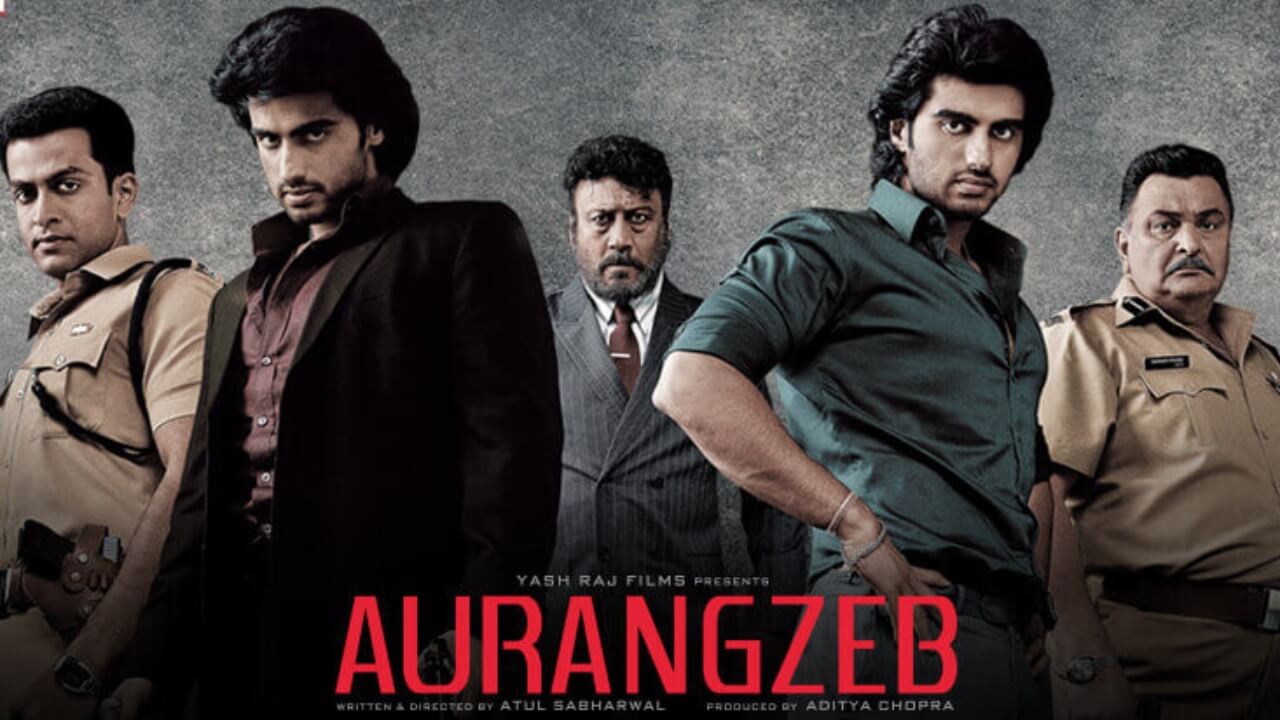The destiny that seems to underline the lives in writer-director Atul Sabharwal’s Aurangzeb a Shakespearean drama of family feuds is as flawed as it is rich in resonances. And why not! Perfection is as boring as it is unbelievable. Sabharwal spreads out a hectic hefty horizon of dark grey black and ominously immoral people who share a common genealogy but are not afraid to kill one another for personal gains.
Welcome to the world of unstoppable ambitions. Half-realized dreams thread their way through Sabharwal’s intricate plot, much like those gigantic cement-mortar-glass skyscrapers that kiss the sky in half-constructed questionable glory in the film’s excellently-composed frames. The cinematography by N. Karthik Ganesh provides a panoramic view of Gurgaon’s super-affluent landscape. It also provides us an insight into the anxious souls of half-finished lives trapped in the mirage of their absurd aspirations.Each moment in Aurangzeb tells a heartbreaking story of betrayal and bloodshed, of men and women who have forsaken a life of peaceful sleep to pursue wakeful dreams that leave them famished and restless.
At first Aurangzeb seems plotted with too many twists and turns. And then as you watch the tale of twin brothers (Arjun Kapoor, very much in character) and a stepbrother, played by Prithiviraj, who turns out to be the moral foundation of this empire of quicksand compulsions, you fall into the rhythm patterns of Sabharwal’s quiet volatile and implosive storytelling.
The film’s grand design subsumes a scintillating galaxy of memorable moments. Nothing in the film is what it seems. No character is to be trusted. There are illegitimate relationships and business interests jostling with their more constitutional counterparts. The twins-device serves as a vivid indication of the moral ambiguities that underscore the world of corporate deals.
Supreme power and supreme wealth are what the characters seek in this film. Funny, how they end up nullified or dead at the end! None more so that the all-powerful cop played by Rishi Kapoor. A closet-extortionist, this powerful policeman’s family-mafia runs parallel to Jackie Shroff’s vast empire of drugs and other criminal activities.
Arjun Kapoor crosses comfortably into both the nefarious kingdoms. He is the dual mirror- image of the sinner and the victim. Playing the traditional ‘Ram Aur Shyam’ game Kapoor seems to nail the brotherly mirror-image into a slide show of shifting loyalties. It’s a compelling double-whammy from a sophomore actor who made a sizeable impact with his first film Ishaqzaade last year.
Prithviraj who made his Hindi debut with the disastrous Aiyya last year, springs a stunning surprise as Arjun Kapoor’s half-brother. He is the voice of this vast plot’s nebulous conscience. It’s finally Prithviraj who redeems the film’s shifting moral values to recover a moral centre for a world that seems to spin out of control with its penchant for power and greed for wealth.
Jackie Shroff plays opposite Rishi Kapoor in this world of crime and the law where the two kingdoms often merge in disturbing alliances. Jackie is controlled, his face a map of generations of endured pain.
Every player, big or small, gives life to the tumultuous Shakespearean tale .I’ve to make mention of the very talented Swara Bhaskara who plays Prithiviraj’s wife. The super-talented girl has just two brief sequences. But she wrenches your heart. Tanve Azmi’s motherly act has its moments. Amrita Singh as a scheming she-devil is the traditional home-breaker. It’s a stereotypical bad-girl role, given a reined-check by the actress’ ingrained grace. Seshah Agha in a role clearly inspired by Parveen Babi in Yash Chopra’s Deewaar is cast in a character that deserved a far better and more seductive actress.
Atul Sabharwal’s direction bears ruminative remnants of the mighty filmmaking legacy of Yash Chopra and Mani Ratnam. The script outwardly sounds like a potboiler about the shifting equation between the legitimate and the outcast. But the tone adapted to tell this potboiler tale is authentic, underplayed and constantly credible. It’s as if Manmohan Desai suddenly decided go the way Shyam Benegal did in Kalyug.
The film is a marvel of impeccable casting. Every actor gives off his best, none more so than Rishi Kapoor who as the illimitably corrupt cop pulls off yet another masterly antagonist’s part.
Aurangzeb springs many unexpected surprises. It is a work which doesn’t shy away from screaming silences and penetrating whispers. The soft spoken words delivered in a natural even pitch are often so far-reaching in their implications that we keep returning to the dialogues much after the characters have spoken them and moved on.
Yes, much in Aurangzeb is imperfect. The ambivalent tone of authenticity in a plot that seems inspired by the melodramatic blockbusters of the 1970s is really an exercise in self-indulgence. It’s as if the director wants to prove his intellectual superiority over the material he has chosen to deconstruct .But the contradictory tone somehow works in a way we’ve never seen before.
Gurgaon on the outskirts of Delhi becomes a hotbed of intrigue and drama. But underneath the conspiracies and the killings is a tragic tale of blood unnecessarily spilt for advantages that finally mean zilch in the absence of loved ones to share the loot with.
Aurangzeb has an epic sweep to its storytelling. But it’s also an intimate portrait of family values gone to waste. It is really the sound of stifled sobs that we carry home of characters who thought they knew it all only to realize at the end that they somewhere lost track of their inner self in pursuit of distant dreams.


